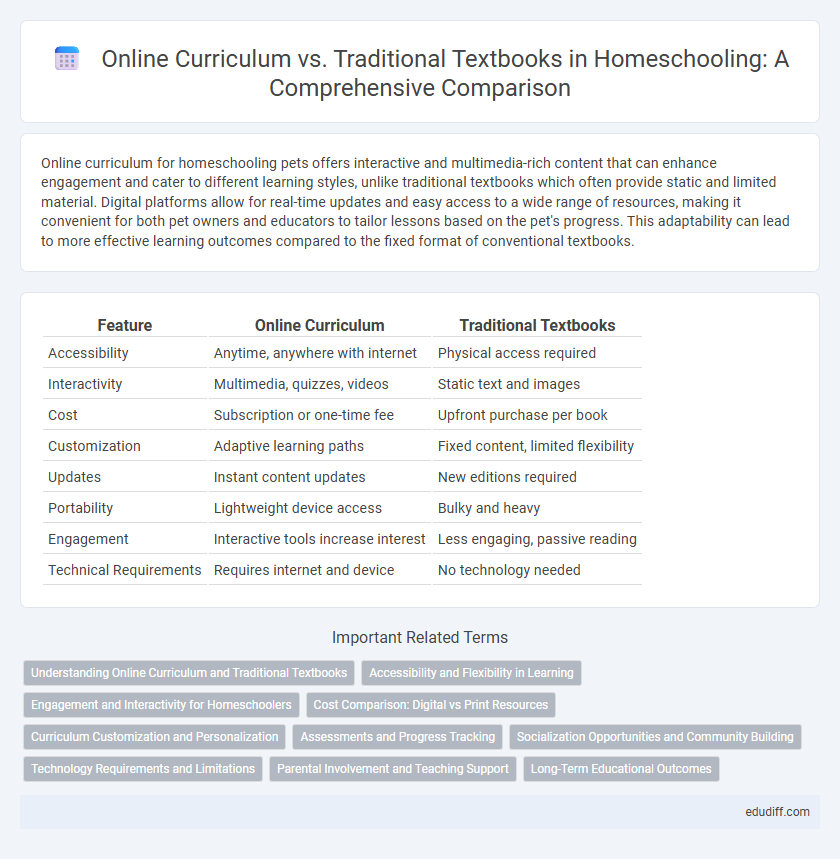Online curriculum for homeschooling pets offers interactive and multimedia-rich content that can enhance engagement and cater to different learning styles, unlike traditional textbooks which often provide static and limited material. Digital platforms allow for real-time updates and easy access to a wide range of resources, making it convenient for both pet owners and educators to tailor lessons based on the pet's progress. This adaptability can lead to more effective learning outcomes compared to the fixed format of conventional textbooks.
Table of Comparison
| Feature | Online Curriculum | Traditional Textbooks |
|---|---|---|
| Accessibility | Anytime, anywhere with internet | Physical access required |
| Interactivity | Multimedia, quizzes, videos | Static text and images |
| Cost | Subscription or one-time fee | Upfront purchase per book |
| Customization | Adaptive learning paths | Fixed content, limited flexibility |
| Updates | Instant content updates | New editions required |
| Portability | Lightweight device access | Bulky and heavy |
| Engagement | Interactive tools increase interest | Less engaging, passive reading |
| Technical Requirements | Requires internet and device | No technology needed |
Understanding Online Curriculum and Traditional Textbooks
Online curriculum offers interactive multimedia resources, immediate updates, and personalized learning paths that enhance engagement and adaptability for homeschooling families. Traditional textbooks provide a structured, tactile learning experience with consistent content but lack the flexibility and interactivity found in digital formats. Combining both methods can optimize comprehension by leveraging online curriculum's dynamic nature alongside the reliability of traditional textbooks.
Accessibility and Flexibility in Learning
Online curriculum enhances accessibility by providing students with instant access to a wide range of interactive resources anytime and anywhere, unlike traditional textbooks that require physical possession. Flexible learning schedules are enabled through digital platforms, allowing homeschoolers to tailor study times to their individual needs and pace. This adaptability supports diverse learning styles and helps maintain engagement in a personalized education environment.
Engagement and Interactivity for Homeschoolers
Online curriculum offers enhanced engagement and interactivity for homeschoolers through multimedia lessons, interactive quizzes, and instant feedback, which traditional textbooks lack. Digital platforms adapt to individual learning paces, increasing motivation and retention by providing tailored activities and real-time progress tracking. Incorporating gamified elements and virtual experiments, online curricula create immersive learning environments that foster deeper understanding compared to static textbook content.
Cost Comparison: Digital vs Print Resources
Online curriculum often offers lower upfront costs compared to traditional textbooks, as digital resources eliminate printing and shipping fees. Subscription models for online courses provide continuous updates and access to a wide range of materials without the need for repeated purchases. In contrast, print textbooks usually require significant initial investment and may become outdated, leading to additional expenses over time.
Curriculum Customization and Personalization
Online curriculum offers unparalleled customization and personalization options compared to traditional textbooks, allowing parents and students to tailor lessons to individual learning styles, pace, and interests. Digital platforms enable real-time adjustments, interactive content, and multimedia resources that enhance engagement and comprehension. Traditional textbooks, while comprehensive, often lack flexibility, making it harder to adapt material to specific educational needs or updates.
Assessments and Progress Tracking
Online homeschool curricula offer dynamic assessment tools and real-time progress tracking, enabling personalized learning paths and immediate feedback. Traditional textbooks often rely on static, periodic tests that lack instant data analysis, making it harder to adjust instruction promptly. Advanced digital platforms integrate analytics that help parents and educators identify strengths and weaknesses efficiently, enhancing student outcomes.
Socialization Opportunities and Community Building
Online curriculum for homeschool offers dynamic socialization opportunities through virtual clubs, discussion forums, and group projects, fostering global community building beyond geographic limits. Traditional textbooks often limit interaction to in-person settings, which may restrict exposure to diverse perspectives and peer engagement. Integrating online platforms with traditional methods enriches social experiences while maintaining structured learning.
Technology Requirements and Limitations
Online curriculum demands reliable high-speed internet, compatible devices like tablets or computers, and updated software to access interactive lessons and assessments. Traditional textbooks require no electronic devices but limit multimedia engagement and instant updates, potentially hindering dynamic learning experiences. Technology limitations such as internet connectivity issues or device malfunctions can disrupt online learning but do not affect textbook-based study continuity.
Parental Involvement and Teaching Support
Online curriculum offers dynamic, interactive lessons and immediate feedback that enhance parental involvement by allowing parents to monitor progress and tailor support in real-time. Traditional textbooks provide a structured, tangible resource requiring parents to invest significant time in lesson planning and supplementary explanations. Teaching support in online programs often includes access to virtual tutors and automated assessments, reducing the instructional burden on parents compared to the reliance on their direct teaching when using textbooks.
Long-Term Educational Outcomes
Online curriculum offers dynamic, interactive content that adapts to individual learning paces, enhancing retention and critical thinking skills over time. Traditional textbooks provide structured, in-depth material that fosters strong foundational knowledge and discipline through consistent study habits. Long-term educational outcomes show that combining both methods can maximize understanding and academic performance in homeschool environments.
online curriculum vs traditional textbooks Infographic

 edudiff.com
edudiff.com